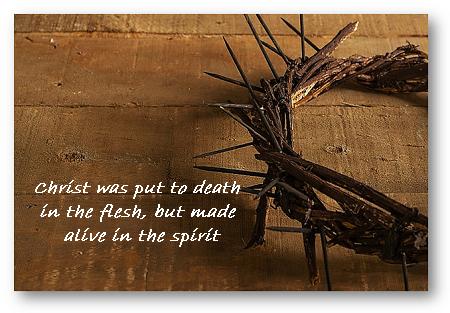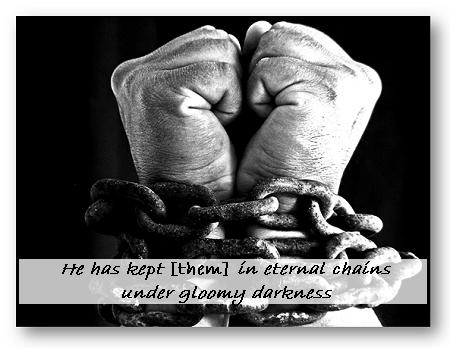1 Peter 3:18-22 - Descended into Hell or Ascended to Heaven
1 Peter 3:18-22 - Descended into Hell or Ascended to Heaven
For Christ … (was) … put to death in the flesh but made alive in the spirit, in which he went and proclaimed to the spirits in prison, because they formerly did not obey, when God’s patience waited in the days of Noah, while the ark was being prepared…
1 Peter 3:18b-20a
Baptism … (is) an appeal to God for a good conscience, through the resurrection of Jesus Christ, who has gone into heaven and is at the right hand of God, with angels, authorities, and powers having been subjected to him.
1 Peter 3:21b-22

Christ, writes Peter, went to the spirits in prison, to proclaim to them a certain message. Does this have something to do with the article of faith ‘he descended into hell’, that we find in the Apostles’ Creed? As readers of a later era, we do not possess the background information that Peter apparently assumed his readers were familiar with. Who are those spirits? What was the substance of this proclamation by Christ? When did it take place?
To begin with the last point: some have thought of the days of Noah. After all, doesn’t Peter, in his other letter, call Noah a ‘herald of righteousness’ (2 Peter 2:5)? In building the ark, Noah called his contemporaries to repentance; and behind Noah, you could say, stood the Spirit of Christ. Hence, it was really Christ who, by way of Noah, was preaching then. The first one to advance this interpretation was Augustine. He understood the expression ‘spirits in prison’ figuratively, as a reference to unbelievers, who were trapped in sin. Still, v. 20 does not describe Noah as a builder of the ark, the head of a family, or a preacher of judgement. His name serves only to indicate a particular time. And the notion that Christ preached ‘via Noah’ seems to us, modern readers of the Bible, rather far-fetched.
‘Spirits in Prison’⤒🔗
Another explanation looks for the ‘spirits in prison’ among those who have died. After all, was Christ himself not ‘dead and buried’? Isn’t it possible that he then descended in a spiritual form into the realm of the dead? Often, reference is made in this interpretation to what we read a little further on: ‘the gospel was preached even to those who are dead’ (ch 4:6). However, the Greek uses a different terminology there, and Christ is not presented as the one who is doing the preaching. In that text, Peter has in mind the brothers and sisters who have already died: when they were living on earth, they did not hear the Gospel in vain. The expression ‘he descended into hell’ from the Apostles’ Creed is not relevant here.
There are also several differing views about the proclamation itself. Who was the intended audience, and what was Christ’s purpose in preaching? Many Roman Catholic commentators assert that Jesus went to proclaim his victory everywhere. At the same time, this proclamation allowed him to set free from the temporary imprisonment of purgatory the penitent among the generation of the flood, those who had turned to God at the last moment, but had been unable to escape death in the deluge. Others take the view that Christ went into Hades (the realm of the dead) to personally proclaim the gospel to unbelievers. As yet, they were still given opportunity to repent. But if Christ had a message for all the dead, why does the text limit itself to only one category, the generation of Noah? And isn’t it true that in this life people are confronted with a decisive choice in this life (Luke 16:19-31).

The idea that Christ preached to the dead is based especially on a particular interpretation of the preceding verse, where Peter said that ‘Christ was put to death in the flesh, but made alive in the spirit’ (v.19). Presumably, Christ in a spiritual form would have addressed the dead. This interpretation, however, is not correct. For in this passage Peter had presented two powers in opposition to each other: people had put Jesus to death, but God, through his Spirit, had raised him to life. This is a reference to Christ’s resurrection. And through this same Spirit, says Peter, Christ had also preached to the spirits in prison. (in the Greek, the conjunction en hooi is grammatically linked to kèrussein).
Departure←⤒🔗
This proclamation, the text tells us, took place at Christ’s departure. What exactly does that mean? Where did Christ go? Did he descend to the realm of the dead? But Peter’s focus is on the rising line of Christ as the ascended Lord. The fact that these spirits are in prison does not yet imply that Christ went to visit them personally. It is only the message that he came to bring that somehow penetrated even to them.
This upward movement of Christ, set in motion at his resurrection, drove Jesus ever higher, right into heaven itself. The ‘he went’ in v. 19 corresponds to the ‘he has gone’ in v.22, where it becomes even more specific: he has ‘gone into heaven’. In other words, Peter is not referring to a descent into hell, but to an ascent into heaven: while he went (into heaven), Christ preached (in Greek: poreutheis ekèruxen).
This was no preaching of the Gospel in the usual sense of the word (for that, Peter uses the verb euangelizein: 1:12; 4:6). Rather, we should think of a herald who publicly proclaims a certain message. Such a message might be tidings of disaster; it might also be news of victory. And indeed, the ascension of Christ meant disaster for the enemies of God, for Christ was now, once and for all, clothed with majesty; it also meant grace for everyone who trusts in him.
It was especially those ‘prisoners’ who would have been deeply impressed by the news of Christ’s victory. We hear nothing, however, about how they reacted. Apparently, they could not but silently acknowledge the superiority of the risen Lord.
People or Angels?←⤒🔗
Now: what about the identity of the spirits in prison: were they people or angels? This question cannot simply be answered by pointing to v.20, referring to the days of Noah; this might lead us, at first glance, to conclude that these spirits are people. For Genesis never makes any explicit reference to the disobedience of the generation of the Flood. That is Peter’s own characterization. While Peter in his letter repeatedly points to human disobedience, specifically to the Word or to the Gospel (ch 2:8; 3:1; 4:17), in this place such a further specification is absent. The days of Noah were marked by a ‘pure’ disobedience, a conflict of authority, as it were, with the Creator, a conflict which could have played out both on earth, on the plane of human existence, and on a higher plane, in the world of the angels. The question therefore remains: Is Peter talking about human beings or about angels?
Generally in the Bible, ‘spirits’ (pneumata) are angelic powers; either demonic or ministering spirits (Matthew 8:16; Luke 10:20; Ephesians 2:2; Hebrews 1:14). Whenever Peter refers to people who have died, he uses the expression ‘the dead’ (see ch 4:6: nekroi). There is only one place in Scripture where we read about ‘the spirits of the righteous made perfect’ (Hebrews 12:23). There, it is clear from the further elaboration that this text is about people. Therefore, there is no reason at all to think that the usual meaning of ‘spirits’ as angels should not apply. On the contrary, where Peter in ch 3:22 makes reference to the Ascension, he says that Christ entered heaven, ‘with angels, authorities, and powers having been subjected to him’.
The word ‘prison’, too, points to angels rather than to people. Nowhere in the Bible is the world of people who have died called a ‘prison’, but we do read about angels who have been remanded in custody. We read about that in 2 Peter and in Jude, as historical examples to show that sin never remains unpunished. Peter uses a Greek expression (‘in Tartarus’, ch 2:4), while Jude uses Hebrew terminology (‘under gloomy darkness’, sheol, v.6). But they point to the same thing: disobedient angels are kept in prison until the time of final judgement:
For … God did not spare angels when they sinned, but cast them into hell and committed them to chains of gloomy darkness to be kept until the judgment…2 Peter 2:4
And the angels who did not stay within their own position of authority, but left their proper dwelling, he has kept in eternal chains under gloomy darkness until the judgment of the great day. Jude 1:6

In times past, these texts have been brought forward as evidence for a fall into sin in the world of the angels, which is not described in Genesis 3. However, the most common contemporary view is that both texts point to the instigators of evil in Genesis 6:1-4. Prior to the Flood there was a revolt within the world of the angels. Then, some of the angels (called ‘sons of God’, see NIV and ESV) left their heavenly home to intermarry with mankind and to cause much trouble. There is a widespread Jewish tradition about Enoch, the man who ‘walked with God’ and was taken up into heaven. According to this tradition, Enoch had to convey God’s judgement to about two hundred rebellious angels, who had intermarried with mankind, to seduce them to sin. At their request, Enoch attempts to mediate, but God upholds his judgement. When the Deluge covers the earth, the rebellious angels, instigators of evil, are imprisoned until the final judgement; thus they disappear once and for all from the world stage.
Apparently, this account was remarkably popular, also among Christians. A short quotation from Enoch is found in the letter of Jude (v.14). Peter uses a few key words to point to this tradition; it seems likely that ‘the spirits in prison’ refer to the angels from the time of the Flood. Because of their pernicious influence on the inhabitants of the ancient world, the ‘days of Noah’ serve as an outstanding example of disobedience (Matthew 24:37-38; Luke 17:26).
What Peter wishes to communicate is this: disobedient sinners, angels as well as humans, will not escape their punishment, but the righteous will be saved from the coming judgement. After all, Christ, through his ascension, has proclaimed his victory; he has silenced, once and for all, the rebellious angels, and now all believers may share in his victory.
Peter wrote his letter to Christians who, because of their faith and baptism, were discriminated against. Whoever follows in the footsteps of Christ will indeed embark on a road of suffering. To some of them, this might even have appeared a dead-end road. Still, Easter did take place, and after that, Christ entered heaven. What may have seemed to be a dead-end road, was in fact the way to victory. Christ now sits at the right hand of God. From the outset, therefore, Christians – those who are baptised in his name – are on the winning side!

Add new comment